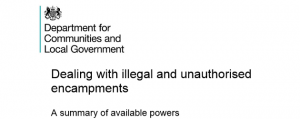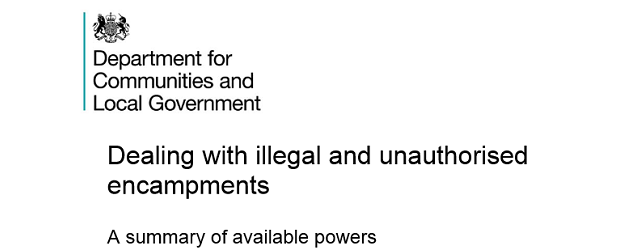The Department for Communities and Local Government has published a summary of available powers to tackle the formation of illegal and unauthorised camp sites and help the reclamation of land and property.
 |
| [relatedPosts title=”Related Posts”] |
|
|
This is the latest edition of the summary of powers on illegal and unauthorised occupation of land. It now includes the removal of restrictions, from planning law, on Temporary Stop Notices for unauthorised caravan encampments which are a main residence.
The “Occupy” encampment at St Paul’s Cathedral brought into focus the question of balance between the right to peaceful protest and the disruptive impact of the illegal occupation of land. The formation of unauthorised campsites can cause problems for the general public and private landowners.
On occasion local authorities and their partner agencies have been unclear about the full range of powers available to them to tackle both illegal and unauthorised encampments sites. This is aimed at being an accessible source of information providing an overview of powers available and to enable the timely reclamation of land and property. This information complements the department’s guide to effective use of enforcement powers and is primarily aimed at local authority officials, but it is also intended to be helpful to landowners and others affected by such encampments.
As mentioned the list of powers are wide ranging and cut across a number of agencies, including the police and highways agency. Nevertheless, the expectation is that local authorities will be proactive in the use of their available powers. Police powers can only be used where there has been criminal activity, serious disruptive behaviour or when intervention is requested by the private owner.
Dealing with illegal and unauthorised encampments: a summary of available powers is available to download here.





